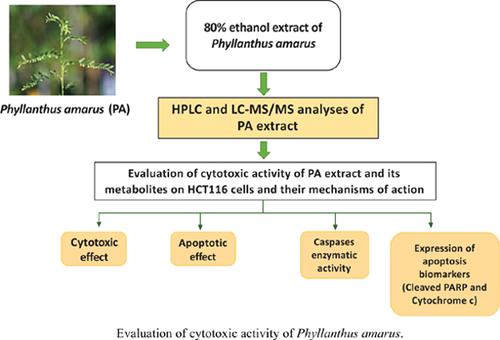Current Pharmaceutical Biotechnology ( IF 2.8 ) Pub Date : 2021-01-31 , DOI: 10.2174/1389201021666200612173029 Shimaa I A Mohamed 1 , Ibrahim Jantan 2 , Mohd A Nafiah 3 , Mohamed A Seyed 4 , Kok M Chan 5

|
Background: The anticancer effects of Phyllanthus amarus extract on various cancer cells have been investigated, however, the effects of its major constituents on HCT116 human colorectal cancer cells have not been reported.
Objective: In the present study, we investigated the cytotoxic effect of 80% ethanol extract of P. amarus and its marker constituents (phyllanthin, hypophyllanthin, gallic acid, niranthin, greraniin, phyltetralin, isolintetralin, corilagin and ellagic acid) on HCT116 and their underlying mechanisms of action.
Methods: Their antiproliferative and apoptotic effects on HCT 116 were performed using MTT assay and flow cytometric analysis, respectively, while caspases 3/7, 8 and 9 activities were examined using the colorimetric method. The expression of cleaved poly ADP ribose polymerase enzyme (PARP) and cytochrome c proteins was investigated by the immune-blot technique.
Results and Discussion: HPLC and LC-MS/MS analyses demonstrated that the extract contained mainly lignans and polyphenols. The plant samples markedly suppressed the growth and expansion of HCT116 cells in a concentration- and time-dependent manner with no toxicity against normal human fibroblast CCD18 Co. P. amarus extract, phyllanthin and gallic acid induced mode of cell death primarily through apoptosis as confirmed by the exteriorization of phosphatidylserine. Caspases 3/7, 8, and 9 activities increased in a concentration-dependent manner following 24h treatment. The expressions of cleaved PARP (Asp 214) and cytochrome c were markedly upregulated.
Conclusion: P. amarus extract, phyllanthin and gallic acid exhibited an apoptotic effect on HCT116 cells through the caspases-dependent pathway.
中文翻译:

mar木中的木质素和多酚和Thonn通过胱天蛋白酶依赖性途径在HCT116人结肠癌细胞中诱导凋亡。
背景:已研究了紫菜提取物对多种癌细胞的抗癌作用,但尚未报道其主要成分对HCT116人结肠直肠癌细胞的作用。
目的:在本研究中,我们研究了80%的a菜乙醇提取物及其标志物成分(叶绿素,次叶绿素,没食子酸,烟碱,香菜素,叶四氢化萘,异四氢萘,可乐汀和鞣花酸)对HCT116的细胞毒性作用。潜在的作用机制。
方法:分别用MTT法和流式细胞术分析它们对HCT 116的抗增殖和凋亡作用,同时用比色法检测胱天蛋白酶3 / 7、8和9的活性。通过免疫印迹技术研究了裂解的聚ADP核糖聚合酶(PARP)和细胞色素c蛋白的表达。
结果与讨论:HPLC和LC-MS / MS分析表明,提取物主要含有木脂素和多酚。植物样品以浓度和时间依赖性方式显着抑制HCT116细胞的生长和扩增,而对正常人成纤维细胞CCD18 Co. P. amarus提取物,phyllanthin和没食子酸诱导的细胞死亡模式无毒性,如证实的那样通过磷脂酰丝氨酸的外在化。在24小时的治疗后,胱天蛋白酶3 / 7、8和9的活性以浓度依赖性的方式增加。裂解的PARP(Asp 214)和细胞色素c的表达明显上调。
结论:mar菜提取物,phyllanthin和没食子酸通过半胱氨酸蛋白酶依赖途径对HCT116细胞具有凋亡作用。


























 京公网安备 11010802027423号
京公网安备 11010802027423号